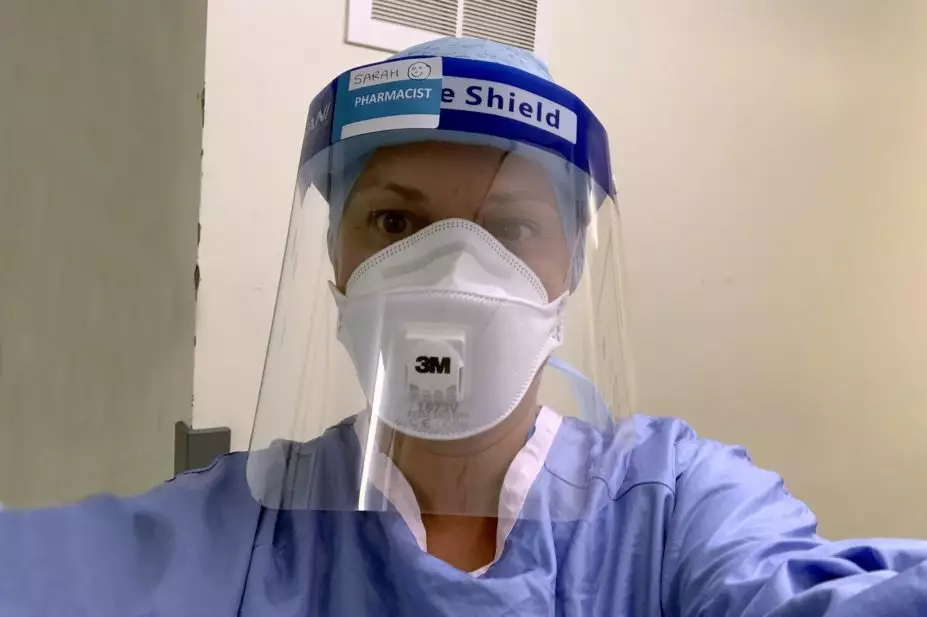
Courtesy of Sarah Seddon
We were warned that we faced a difficult environment. We were taught how to safely don and doff our personal protective equipment (PPE). But in the middle of a COVID-19-positive intensive care unit (ICU), I found myself sobbing into my mask — they definitely didn’t cover this in training.
Inside a mask, my breathing feels desperate: the tight seal keeps me safe, but right now I feel as though it is suffocating me. I need to wipe my eyes, but I can’t. I resent my mask — I’ve realised how much we rely on expressions to communicate with each other and to build trust.
We recognise each other by the names and roles scribbled on our visors. I draw a smiley face next to mine; I want people to know that I’m smiling at them. I miss seeing smiling faces. I even miss cross and frustrated ones. I need to see emotions. And I need a hug, but social distancing rules certainly do not allow this.
I can no longer grab a ‘quick’ drink; I need to carefully remove all items of PPE (washing my hands after removing each one), then repeat the same in reverse before going back into the red (COVID-19-positive) area. It feels ridiculous, but it is necessary. I feel guilty that I’m wasting PPE and time, when I could be delivering care directly to patients. But this is the ‘new normal’ — this is just how long it takes to complete simple tasks now. Sometimes it all feels too much, and the emotion spills out of me.
Two months ago, I hadn’t set foot on an adult intensive care unit for almost ten years, but with the rise of COVID-19, the unit was ventilating nearly three times its usual maximum capacity of patients; it needed more clinical pharmacy support.
We ran low on many vital drugs and had to use alternatives. At risk of running out of syringe drivers, we had to administer drugs in different, but safe, ways. We also had to carve out new space to store extra medicines (including controlled drugs). All the while we were learning more about our new patients’ medical needs.
But our patients need their loved ones around them too, and I have been heartbroken to see so many patients alone, connected to their families only by video calls. The compassion shown by hospital staff towards these families will always stay with me.
Being on the ICU brings home how serious COVID-19 can be. It seems to pick people out at random. My constant thought is that it could easily be me and that I could be taking this horrible virus back to my family.
Each time I leave for work, I’m acutely aware that I’m also needed at home, where my husband is working full time while also trying to home-school our three young children. They’ve been unsettled by lockdown, and I feel guilty that I’m not there enough for them. They miss people and new experiences. They understand a little of the situation, but they don’t really ‘get it’. I worry that their conditioning to stay two metres away from others will make them frightened of the world. They catch snippets of the news which worry them: my daughter wrote me a letter to say that she didn’t want me to die.
I am unsettled too. The unknown is so hard to deal with. I wonder how long all this can all be sustained for. And how we will get back to any kind of normal. I worry that my best isn’t good enough and feel I have a huge responsibility to get it right in this intense and overwhelming new way of working. I have so much more to learn. There are simply not enough hours in the day — both work and home are so busy with no let-up.
But we all carry on. I am so humbled to watch colleagues rolling up their sleeves and giving it their all. Teams that would never normally have crossed paths are working together, and appreciating and supporting each other beautifully. There really is an ‘in it together’ mentality and a deep, shared aim to treat patients with the utmost humanity.
This has been one of the most difficult phases of my career. I desperately wish I could change the outcomes for some of my patients, and how underprepared the nation was for this crisis. But I would never change being able to work as clinical pharmacist on ICU during this pandemic. It has reminded me why I became a pharmacist and what can be achieved when people truly work together.
Sarah Seddon, specialist clinical pharmacist, Sherwood Forest Hospitals NHS Foundation Trust, Nottinghamshire


